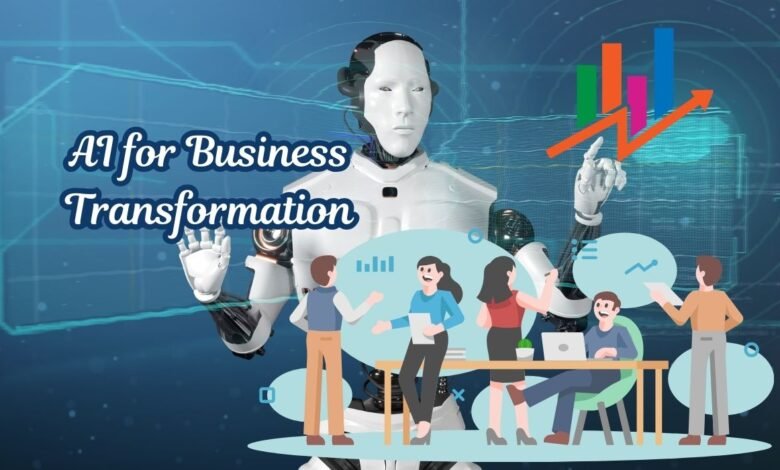Harnessing the Power of AI: How Artificial Intelligence is Transforming Businesses
AI revolutionizes businesses! Explore how artificial intelligence is boosting efficiency, customer experience, & innovation across industries.

Artificial Intelligence (AI) refers to the simulation of human intelligence in machines programmed to think and learn like humans. The basic principles of AI involve creating algorithms that can process information, recognize patterns, and make decisions based on data. These capabilities are achieved through various types of AI, including machine learning, deep learning, and neural networks.
Machine Learning: This subset of AI involves training algorithms using large datasets to improve their performance over time without being explicitly programmed. By analyzing patterns in data, machine learning models can make predictions or identify trends.
Deep Learning: A more advanced form of machine learning, deep learning uses neural networks with multiple layers to analyze complex data structures. This approach allows for more nuanced and accurate data interpretation, often used in image and speech recognition.
Neural Networks: These are computational models inspired by the human brain’s structure, consisting of interconnected nodes (neurons) that process information. Neural networks are crucial for deep learning, enabling machines to learn from vast amounts of data.
The historical development of AI dates back to the mid-20th century, with key milestones such as the creation of the first AI programs in the 1950s and the development of the backpropagation algorithm in the 1980s, which significantly advanced neural networks. Over the years, AI has evolved from simple rule-based systems to sophisticated models capable of self-learning and adaptation.
Today, AI technology boasts impressive capabilities, including natural language processing, computer vision, and autonomous decision-making. However, it also has limitations, such as the need for vast amounts of data, potential biases in algorithms, and ethical concerns regarding its impact on privacy and employment.
Key Facts:
- AI: Simulation of human intelligence in machines.
- Machine Learning: AI subset that improves over time with data.
- Deep Learning: Advanced machine learning using neural networks.
- Neural Networks: Models inspired by the human brain’s structure.
- Historical Development: Significant milestones from the 1950s to today.
- Current Capabilities: Natural language processing, computer vision, autonomous decision-making.
- Limitations: Data requirements, potential biases, ethical concerns.
AI in Everyday Business Operations
Artificial Intelligence (AI) has become an integral part of everyday business operations across various industries, revolutionizing the way companies conduct their activities. One of the prominent applications of AI is in customer service through the use of chatbots. These AI-powered chatbots handle customer inquiries, provide support, and resolve issues in real-time, thereby reducing the workload on human agents and ensuring 24/7 customer service availability. This enhances customer satisfaction by providing instant responses and personalized interactions.
Predictive analytics is another area where AI is making significant strides. By analyzing historical data and identifying patterns, businesses can forecast future trends, customer behaviors, and market demands. This allows for better decision-making, inventory management, and resource allocation, ultimately leading to cost savings and increased efficiency. For example, retailers use predictive analytics to optimize stock levels and anticipate consumer preferences, thereby minimizing overstock and stockouts.
Automated marketing strategies driven by AI enable businesses to target their audience more effectively. AI algorithms analyze consumer data to create personalized marketing campaigns, recommend products, and optimize ad placements. This not only improves the return on investment (ROI) of marketing efforts but also enhances the customer experience by delivering relevant and timely content.
Real-world examples illustrate the transformative impact of AI in business operations. For instance, Netflix uses AI to recommend shows and movies based on user preferences, significantly improving user engagement. Similarly, Amazon employs AI for its recommendation engine, driving a substantial portion of its sales through personalized suggestions.
Specific business functions transformed by AI include:
- Customer support through AI chatbots
- Inventory and supply chain management with predictive analytics
- Personalized marketing and sales strategies
- Fraud detection and risk management in financial services
- HR processes such as recruitment and employee engagement
By integrating AI into everyday operations, businesses are able to enhance efficiency, reduce operational costs, and improve customer satisfaction, paving the way for a more innovative and competitive landscape.
Benefits of AI for Businesses
Artificial Intelligence (AI) is revolutionizing how businesses operate, offering a multitude of benefits that drive growth and efficiency. One of the primary advantages is the significant increase in productivity. AI systems can automate repetitive tasks, allowing human resources to focus on more strategic activities. This automation not only speeds up processes but also reduces the likelihood of human error, leading to more consistent and reliable outcomes.
AI also enhances decision-making capabilities. Through advanced data analytics, AI can process vast amounts of information quickly, providing valuable insights and forecasts. This allows businesses to make informed decisions based on real-time data, rather than relying on intuition or outdated information. As a result, companies can respond more swiftly to market changes and consumer demands.
Moreover, AI fosters the creation of new business opportunities. By leveraging machine learning and predictive analytics, businesses can identify emerging trends and untapped markets. This paves the way for innovative products and services, giving companies a competitive edge. Additionally, AI-driven customer insights can lead to personalized marketing strategies, increasing customer engagement and loyalty.
Staying competitive in today’s fast-paced market is another crucial benefit of AI. The technology enables businesses to quickly adapt to new trends and technologies, ensuring they remain relevant. Companies that integrate AI into their operations can outpace competitors by offering faster, more efficient services and products.
Key benefits of AI for businesses include:
- Increased productivity through automation
- Enhanced decision-making with real-time data analysis
- Creation of new business opportunities via trend identification
- Improved customer engagement through personalized strategies
- Ability to stay competitive by quickly adapting to market changes
Overall, AI is not just a technological advancement but a strategic asset that can transform business operations, driving growth, efficiency, and competitiveness in an ever-evolving landscape.
Challenges and Ethical Considerations
Implementing artificial intelligence (AI) in businesses, while offering transformative potential, also presents several challenges and ethical considerations. Addressing these concerns is essential to harness AI responsibly and effectively.
One of the primary challenges is data privacy. AI systems often require vast amounts of data to function optimally, raising concerns about how this data is collected, stored, and utilized. Businesses must ensure that they comply with data protection regulations and implement robust security measures to safeguard sensitive information.
Another significant issue is job displacement. As AI automates tasks traditionally performed by humans, there is a risk of significant workforce disruptions. Companies need to proactively manage this transition by investing in employee retraining programs, enabling workers to acquire new skills and adapt to the evolving job market.
Transparency in AI decision-making processes is also crucial. AI systems can sometimes operate as “black boxes,” making decisions without clear explanations. This lack of transparency can lead to mistrust and ethical dilemmas, especially in critical areas such as healthcare and finance. Businesses should strive to develop AI models that are interpretable and provide clear reasoning behind their decisions.
To navigate these challenges, businesses can adopt the following best practices:
- Regularly audit AI systems to ensure they comply with ethical standards and regulations.
- Implement transparent data collection and usage policies to maintain customer trust.
- Invest in continuous employee education and retraining programs to mitigate job displacement impacts.
- Develop AI models with built-in explainability to enhance transparency and accountability.
- Engage in open dialogue with stakeholders to address ethical concerns and build a responsible AI strategy.
By addressing these challenges and adhering to ethical considerations, businesses can leverage AI’s transformative power while ensuring responsible and sustainable implementation.
- Breaking: India’s Q4 GDP at 7.8%, FY24 Growth Reaches 8.2%
- India’s IndiGo testing software, in-flight messages for passenger safety
FAQ on How Artificial Intelligence is Transforming Businesses
How is AI transforming businesses?
AI is impacting businesses in numerous ways, including:
- Automation: AI automates repetitive tasks, freeing up human employees for more strategic work. This can improve efficiency and reduce costs.
- Data analysis: AI can analyze vast amounts of data to identify trends, predict customer behavior, and optimize processes. This leads to better decision-making.
- Enhanced customer experience: AI-powered chatbots can provide 24/7 customer support, personalize marketing campaigns, and recommend products or services.
- Innovation: AI can help businesses develop new products and services by analyzing market trends and customer needs.
What are some specific examples of AI applications in business?
- Manufacturing: AI can optimize production lines, predict maintenance needs, and improve quality control.
- Retail: AI can personalize product recommendations for online shoppers, optimize pricing strategies, and manage inventory more effectively.
- Finance: AI can detect fraudulent activity, automate loan approvals, and personalize financial products for customers.
- Healthcare: AI can analyze medical images, assist in diagnosis, and personalize treatment plans.
What are the benefits of using AI in business?
- Increased efficiency and productivity
- Improved decision-making
- Enhanced customer experience
- Reduced costs
- Innovation and competitive advantage
What are some challenges of using AI in business?
- Cost of implementation and maintenance
- Data security and privacy concerns
- Ethical considerations around bias and job displacement
- Need for skilled personnel to manage and utilize AI systems
How can businesses get started with AI?
- Identify areas where AI can add value
- Start small and experiment with specific AI applications
- Invest in training for employees
- Ensure data security and privacy are prioritized
Will AI replace human jobs?
AI is likely to automate some tasks, but it will also create new job opportunities. Businesses will need employees with skills to develop, manage, and utilize AI systems.
The future of AI in business is bright, with continuous advancements offering even greater opportunities for businesses to improve efficiency, innovation, and customer experience.



